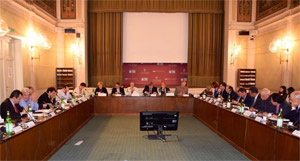news
Fernández Highlights the Achievements and Challenges of Democracy in the Region
November 25, 2014
The former President of the Dominican Republic and President of the Dominican Liberation Party, Leonel Fernández, said that more than three decades after democracy was installed in Latin America as the dominant political system in the region, today it is subject to new challenges due to the rise of a variety of political actors and the emergence of new institutions and forms of governance.
Fernández, speaking at the meeting on “Next Generation
Democracy”, organized by the Club de Madrid and the Center for Justice and Human Rights of the Robert F. Kennedy Foundation, said that, while there has been progress in terms of holding periodic free and fair elections that legitimize the access to power, there are high expectations regarding the ability of democracy to respond to the need for poverty reduction, job creation, the strengthening of the middle class and ensuring the protection of public safety.

Fernández, who is also President of Fundación Global Democracia y Desarrollo (Funglode), argued that the global economic crisis that began in 2008 has had a negative impact on the countries of the region, because it has affected international trade, it has reduced government revenue, it has reduced the levels of public investment and increased unemployment, thereby eroding citizen
support to democratic governments.
He added that, from the institutional point of view, a weakening of the political parties, an increased voter abstention, conflicts between State branches, and tensions with civil society and the media have been observed in several countries of the area.
Moreover, he noted that there are new elements that have an impact on the revitalization of the democratic system, such as the use of new information and communication
technologies, including social networks, the decentralization of the State and the rise of the municipal branch.
“In order for democratic governance to exist in Latin America and the Caribbean, in the future it will be required to improve the quality of public administration with a view to providing services to citizens that are efficient and transparent, to strengthen mechanisms for accountability, to make conflict resolution more effective and to promote, on
an ongoing basis, agreements, political dialogue and social inclusion”, said the former Head of State.
Over one hundred experts who are considered among the best in the world on issues of democracy, and who belong to academia, multilateral organizations, the private sector and civil society, also participated in the event.
Several working groups were formed on this occasion encompassing the different regions of the world. President Fernández
was part of the Working Group of the Americas, in which he played a substantial role, along with other Latin American former Heads of State.
Other dignitaries who attended the event are: Kjell M. Bondevik, from Norway; George Papandreou, from Greece; Kim Campbell, from Canada; Vaira Vike-Freiberga of Latvia; John Kufuor of Ghana; Sadiq al Mahdi, from Sudan; Olusegun Obasanjo of Nigeria; Roza Otunbayeva, from Kyrgyzstan; OrJigme Yoser Tingley, from Bhutan, all of them
democratically elected former Heads of State.
Meanwhile, among the international experts and renowned academics who participated are: Larry Diamond, from Stanford University; JHH Weiler, President of the University Institute of Florence; and, Roelf Meyer, former Minister in South Africa during the governments of Frederick De Klerk and Nelson Mandela and one of the key players in the transition of the African country from the “apartheid” to
democracy.
Likewise, the following well known entrepreneurs attended the event: Mo Ibrahim (Sudan) and Steve Killelea (Australia) who are famous because of their philanthropy, and Beatriz Merino, former Head of Government of Peru and the first woman to reach that position in Latin America.
The former Heads of State, together with the international experts, analyzed the status and the quality of democracy in the world, and proposed solutions that are
considered transformational and capable of reversing the process of deterioration that is affecting them.
The meeting of the year 2014 was co-sponsored by the Robert F. Kennedy Center for Justice and Human Rights, and it focused on the issue of “Democracy and Human Rights in Decline?”
Is democracy in decline? Is it failing to protect human rights?, these are some of the questions to which 40 members of the Club de Madrid and one
hundred of the best experts in the world on democracy, belonging to academia, multilateral organizations, the private sector and civil society, tried to answer.
This time, the event was held at the headquarters of the European University Institute in the city of Florence, Italy.






